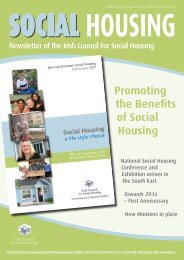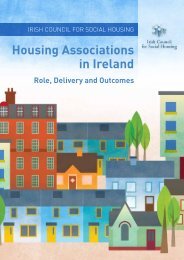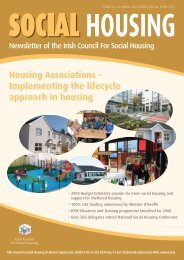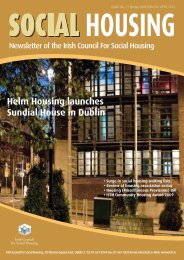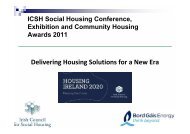eing appropriately housed 84 . This strategy supports the policy of community based livingand access to mainstream housing provision, where appropriate, <strong>for</strong> people <strong>with</strong> mentalhealth disabilities, who have low or medium support needs. Mental health services have akey role to play in assisting and facilitating referral and access to housing.(b) Management of <strong>Housing</strong> Process <strong>for</strong> <strong>People</strong> <strong>with</strong> a Mental Health <strong>Disability</strong>9.31 Applications <strong>for</strong> housing services by people <strong>with</strong> a mental health disability need to becarefully managed by local authorities. Engaging <strong>with</strong> authorities in respect of housingapplications can prove extremely challenging <strong>for</strong> many people <strong>with</strong> a mental healthdisability, particularly if they do not have family or advocacy support. Difficulties can arise inrespect of applicants who frequently change address, are admitted to hospital <strong>for</strong> treatmentor are unable to engage effectively <strong>with</strong> the housing authority by virtue of their disability.Where necessary, a housing authority should make appropriate arrangements to assist aperson <strong>with</strong> a mental health disability through the housing application process. Forexample, where applicants fail to reply to letters from an authority, it is considered goodpractice to implement measures, at the discretion of the authority, to check as far aspossible, if applicants are no longer in need of housing or have left the area. This approachcan be supported <strong>with</strong> ongoing liaison <strong>with</strong> the HSE.(c) Security of Tenure9.32 Security of tenure is a critical issue <strong>for</strong> people <strong>with</strong> mental health disabilities. Astable home is vital in promoting recovery and insecurity or uncertainty regardingaccommodation can exacerbate a mental health disability. <strong>People</strong> may be at risk of relapsewhere tenure is lost or in doubt. Issues may also arise regarding the sustainment oftenancies where people may have to enter hospital <strong>for</strong> treatment <strong>for</strong> long periods. However,this does not imply that certain tenures cannot be considered <strong>for</strong> people <strong>with</strong> mental healthdisabilities. <strong>People</strong> <strong>with</strong> a mental health disability, in common <strong>with</strong> others, have changingneeds throughout their lifecycle – in this context, a variety of tenures may provideappropriate solutions. As previously outlined, housing schemes such as RAS and long termleasing, given the length of contract involved and the diversity of locations, may beparticularly suitable <strong>for</strong> people <strong>with</strong> mental health disabilities. In the case of private rentedaccommodation, the Residential Tenancies Act, 2004 has significantly improved the securityof tenure of tenants in rented properties. Tenancy sustainment services and earlyintervention mechanisms are crucial in assisting people <strong>with</strong> mental health disabilities tomanage and resolve tenancy difficulties. Furthermore, supportive work undertaken by the84The VFM report on the Efficiency and Effectiveness of Long Stay Residential Care <strong>for</strong> Adults <strong>with</strong>in the MentalHealth Services noted that people in residential mental health services have a reduced chance of being housedby their local authority, as these people are not seen as a priority by local housing authorities because they arebeing accommodated by the HSE. The report also noted the existence of mental health ghettos, quoting anexample where more than 50% of community residences in one area are located on one street.114
HSE and disability organisations <strong>with</strong> the families and carers of people <strong>with</strong> mental healthdisabilities is essential in order to assist in strengthening, and thereby preventing, thebreakdown of support mechanisms.9.33 All relevant agencies need to be cognisant that people may develop a mental healthdisability when they are already in appropriate long-term housing. In such cases, where theacquired disability may affect the person’s ability to maintain their housing, communitymental health teams and housing authorities, and other relevant providers must engage<strong>with</strong> a view to providing appropriate support. Provision of support to carers and families isalso necessary. Research 85 has shown that the preferred accommodation of a significantnumber of people <strong>with</strong> mental health disabilities is their family home. There<strong>for</strong>e, priorityshould be given as far as possible to support the family unit and prevent breakdown.(d) Design and Location Considerations9.34 To be conducive to recovery, housing <strong>for</strong> people <strong>with</strong> a mental health disabilityshould be secure, amenable, reflect customer choice, in so far as is possible, 86 integratedinto local communities and incorporate flexible, individualised and accessible supports.Choice, location and design of dwellings are of paramount importance in assisting in themanagement of a mental health disability.9.35 <strong>People</strong> <strong>with</strong> a mental health disability can be particularly vulnerable to anti-socialbehaviour and this should be taken into account when allocating housing. Anti-socialbehaviour can have a profoundly negative impact on individuals who are prone to delusionalbehaviour or spells of acute paranoia or anxiety. Under the <strong>Housing</strong> (MiscellaneousProvisions) Act 2009 87 , each housing authority is required to adopt an anti-social behaviourstrategy <strong>for</strong> the prevention of anti-social behaviour in its housing stock. These strategiesaddress local authority housing, long term leasing, RAS accommodation, tenant purchaseproperties and halting sites. The strategies include complaints procedures, prevention andreduction plans and the education of tenants. They are <strong>for</strong>med in consultation <strong>with</strong> JointPolicing Committees, An Garda Síochána, HSE, local drugs task <strong>for</strong>ces, estate managementcommittees, etc. and adopted by local authority members. It is recommended that relevantdisability organisations are also consulted in the preparation of anti-social behaviourstrategies.85A study of homeless mental health service users in Dublin found that 59% stated that they would prefer to live<strong>with</strong> others and that the first preference (42%) is to live <strong>with</strong> their families. Cowman J. (2008) Descriptions ofhousing and support preferences of homeless mental health service users in Dublin (unpublished thesis)86Increased choice and control on the part of persons <strong>with</strong> a disability leads to increased perceptions of qualityof life and community adjustment – (Nelson et al 2006)87Section 35 of the 2009 Act was brought into operation on 1 December 2009 by S.I. 449 of 2009. Localauthorities were required <strong>with</strong>in one year of the coming into operation of this section, to draw up and adopt ananti-social behaviour strategy.115
- Page 1:
National Housing Strategy for Peopl
- Page 4 and 5:
Index of Tables, Charts andCase Stu
- Page 6 and 7:
ForewordThe ‘National Housing Str
- Page 8 and 9:
implementation progress reports whi
- Page 10 and 11:
6. To consider good practice in the
- Page 12 and 13:
needs. Furthermore, the potential f
- Page 14 and 15:
centred responses, information prov
- Page 16 and 17:
The full set of actions underpinnin
- Page 18 and 19:
Strategic Aim 3To support people wi
- Page 20 and 21:
Strategic Aim 5To address the speci
- Page 22 and 23:
Strategic Aim 6To consider good pra
- Page 24 and 25:
Strategic Aim 8To improve the colle
- Page 26 and 27:
Chapter 1Introduction1.1 The Nation
- Page 28 and 29:
Chapter 2Context and BackgroundIntr
- Page 30 and 31:
• To ensure a high level of aware
- Page 32 and 33:
the phased closure of admissions to
- Page 34 and 35:
• Service users who have been ina
- Page 36 and 37:
Chapter 3Vision and Strategic AimsV
- Page 38 and 39:
SA7 To facilitate people with a dis
- Page 40 and 41:
Chart 4.aProportion of the Populati
- Page 42 and 43:
Local AuthorityAreaPopulationPopula
- Page 44 and 45:
Living arrangements of people with
- Page 46 and 47:
4.9 Based on the analysis above, it
- Page 48 and 49:
Table 4.3: Type of Living Arrangeme
- Page 50 and 51:
Chapter 5Housing Services5.1 The ob
- Page 52 and 53:
extended to include approved housin
- Page 54 and 55:
Rental Accommodation Scheme (RAS)5.
- Page 56 and 57:
Under CAS, approved housing bodies
- Page 58 and 59:
5.27 The total number of units prov
- Page 60 and 61:
Private Housing5.34 While many peop
- Page 62 and 63:
5.41 The key issues identified from
- Page 64 and 65:
eviewed maximum rent limits to refl
- Page 66 and 67: 6.4 Previously, under Section 9 of
- Page 68 and 69: and in the context of Government pr
- Page 70 and 71: Database (NIDD) and the National Ph
- Page 72 and 73: 6.25 The Act provides powers for th
- Page 74 and 75: Chapter 7Interagency CooperationInt
- Page 76 and 77: advocates (where appropriate) and d
- Page 78 and 79: integral support to the housing fun
- Page 80 and 81: Case Management Subgroup7.15 It is
- Page 82 and 83: Chapter 8HousingPhysical Accessibil
- Page 84 and 85: 8.4 In Ireland, the increasing dema
- Page 86 and 87: Current Legislative / Policy Contex
- Page 88 and 89: Table 8.3 Disabled Persons / Essent
- Page 90 and 91: persons with moderate disabilities,
- Page 92 and 93: Table 8.4: Lifetime Homes Standard
- Page 94 and 95: undertaking a review in 2010, to as
- Page 96 and 97: 8.32 In assessing and planning to m
- Page 98 and 99: • Development of an integrated ca
- Page 100 and 101: • Further to consideration by the
- Page 102 and 103: Census did not provide details of c
- Page 104 and 105: 9.11 A Vision for Change contains t
- Page 106 and 107: 9.3 and 9.4 76 . A Vision for Chang
- Page 108 and 109: • Most service users currently re
- Page 110 and 111: 9.20 The phased timescales for tran
- Page 112 and 113: 9.24 The transition of people with
- Page 114 and 115: medical certificates. Their applica
- Page 118 and 119: 9.36 The following factors are reco
- Page 120 and 121: message through a series of communi
- Page 122 and 123: During regular visits support staff
- Page 124 and 125: mainstream housing, the scheme prov
- Page 126 and 127: Table 10.1: Main Residential Circum
- Page 128 and 129: 10.8 The guiding principle of the w
- Page 130 and 131: Table 10.2: Congregated Settings -
- Page 132 and 133: Name of CentreNo. of long-termresid
- Page 134 and 135: 10.16 The NIDD noted that of the pe
- Page 136 and 137: Case Study - Jimmy’s Story10.23 T
- Page 138 and 139: Chapter 11 Information, Advice andA
- Page 140 and 141: 11.6 While it is clear that there a
- Page 142 and 143: • Providing information in an acc
- Page 144 and 145: advocacy role for all citizens over
- Page 146 and 147: Appendix 1 Membership of NationalAd
- Page 148 and 149: Appendix 2 Membership of MentalHeal
- Page 150 and 151: (d)The housing needs of people with
- Page 152 and 153: Appendix 5 Results of 2008Assessmen
- Page 154 and 155: The table below shows levels of inc
- Page 156 and 157: • The Director of Services of the
- Page 158 and 159: 4. Confirmation of the approval in
- Page 160 and 161: Appendix 1Information required for
- Page 162 and 163: Appendix 8 Individual Assessmentof
- Page 164 and 165: the housing authority will advise t
- Page 166 and 167:
UnitsHighSupportMediumSupportLowSup
- Page 168 and 169:
‘Accommodation tends to be in ope
- Page 170 and 171:
Bibliography• Access to Informati
- Page 172 and 173:
• Housing (Standards for Rented H
- Page 174 and 175:
• Trends in the Development of Ir



